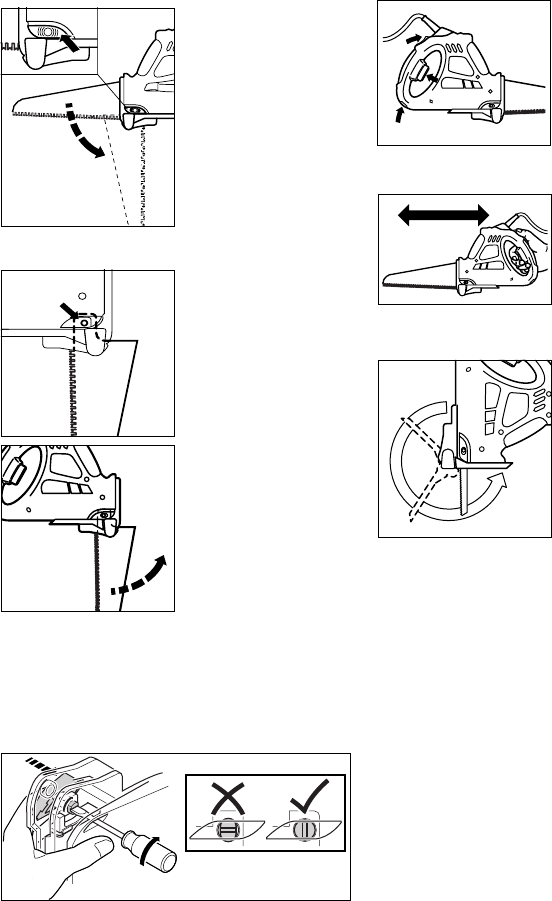
7
ENGLISH
Always ensure the unit is unplugged from the power
supply when changing blades.
Always ensure the tooth protector is fitted when
changing blades.
REMOVING THE BLADE
Ensure blade has cooled
after use. Press and hold
the rear of the blade
release button fully, hold
the back of the blade
and rotate the blade
through 90° as shown in
the diagram. Slide the
blade sideways off the
retaining pin and
remove from the saw.
FITTING A BLADE
Place the blade with the
tooth protector fitted
over the location pin. The
blade teeth should be
facing the handle.
Rotate the blade through
90° until it is fully located
in the slot and the
location pin is in the
locked position.
To ensure the blade is
securely fitted try to
remove without pressing
the blade release button.
Remove the tooth
protector, your saw is
now ready for use.
Note: If you are unable to fit the blade, check if the
location pin is in the correct position as shown
below. If it is not, keep the blade release button
depressed and use a screwdriver to turn the location
pin into the correct position.
OPERATING YOUR SCORPION SAW
Variable speed trigger switch
Your Scorpion Saw is equipped with a variable speed
trigger switch that allows you greater control over
start of cut, rate of cut and breakthrough of cut.
To switch your Scorpion
Saw on, push lock-off
button (2) and squeeze
the on/off variable
speed trigger switch (1).
To switch off, release
the trigger, the unit will
automatically lock-off.
Standard Mode
To obtain the best results
from your Scorpion Saw,
use the same backward
and forward movement
you would employ with
a traditional hand saw.
This will enable a quicker cleaner cut.
Operating in Jigsaw Mode
Disconnect unit from
power supply. Remove
blade, rotate shoe
through 270˚ and secure
in position. Fit curve
cutting blade.
Remove tooth protector
and your Scorpion Saw
is now ready for use.
Cutting Metal
Your Scorpion Saw can be used for cutting light
gauge ferrous and non-ferrous metals such as
copper, brass, aluminium, etc. See recommended
materials.
It is advisable when cutting thin sheet to clamp a
backing sheet of soft wood or plywood to the work
as this will enable you to obtain a cleaner cut. Both
metal and wood backing are sawn together. Do not
force the cutting blade into the metal as this will
reduce the life of the blade and possibly damage the
motor. Cutting thin metal will take longer than cutting
even a relatively thick piece of wood, so do not be
tempted to speed up the operation by forcing the
saw. Spread a thin film of oil along the proposed
cutting line before cutting.
Only use the metal cutting blade for this purpose.














